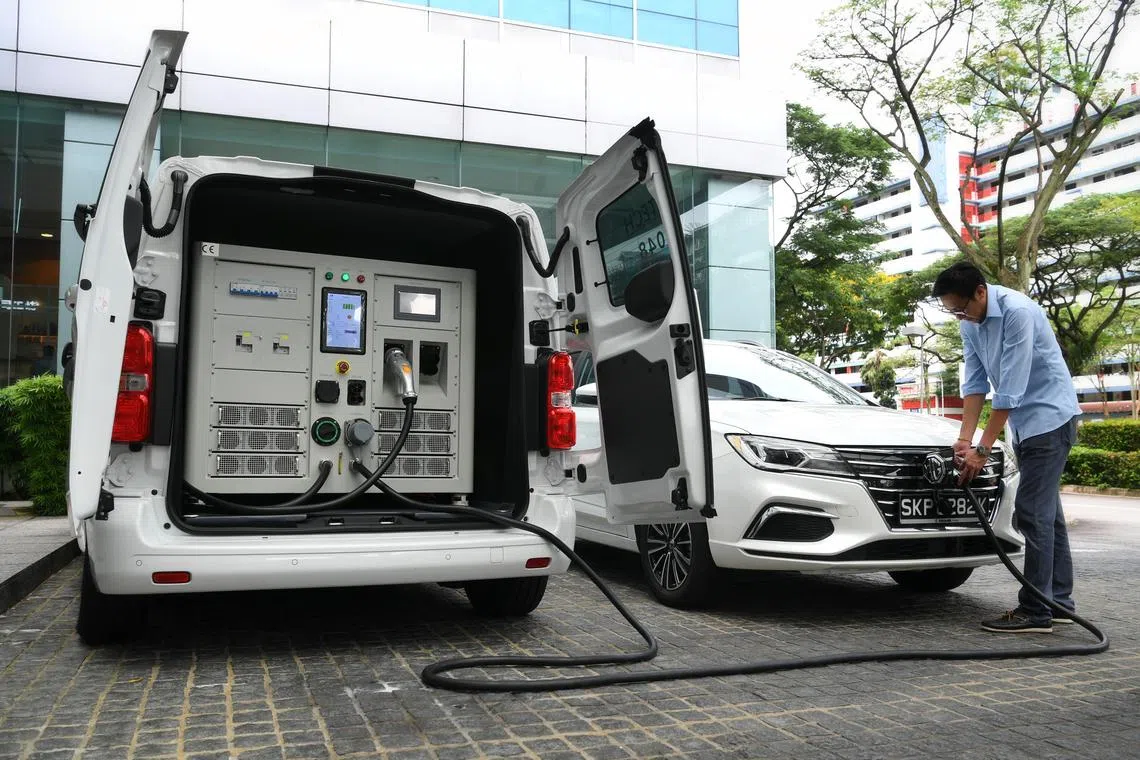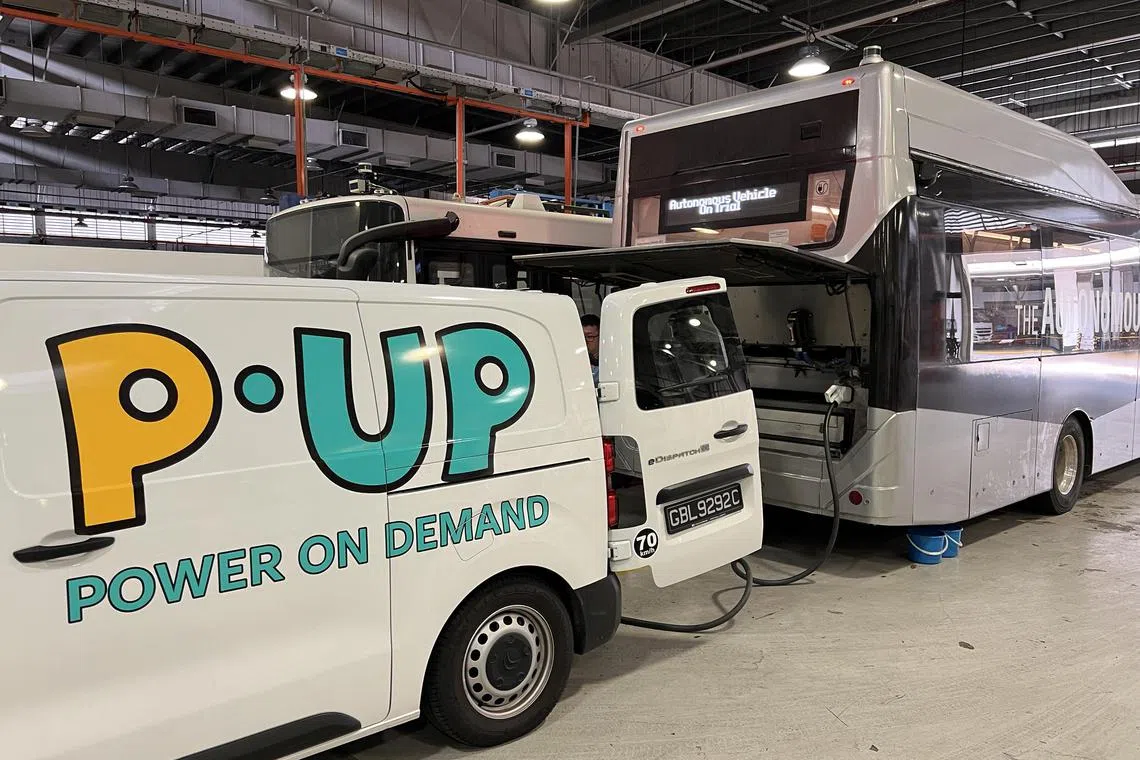Two S’pore firms to test mobile charging service for electric vehicles until 2028
Sign up now: Get ST's newsletters delivered to your inbox

A special permission valid for four years has been given to two local companies to offer on-demand, mobile EV charging services.
ST PHOTO: CHONG JUN LIANG
Follow topic:
SINGAPORE - Two Singapore companies offering mobile charging for electric vehicles (EVs) have been given the green light to do so for four years, as part of trials.
With the go-ahead from the Land Transport Authority (LTA), Power-Up Tech will be allowed to deploy up to 10 mobile charging systems to juice up EVs, including vans and buses.
Beecharge Innovation Group will dispatch up to eight sets of mobile charging systems to support providers of shared EVs and commercial fleet operators.
These companies have power packs and EV chargers that are loaded onto vehicles, allowing them to offer on-demand charging services to EV drivers with no convenient access to a permanent charger.
The LTA in a statement on June 11 said it issued permits to two other outfits to test battery charging and swopping systems for electric heavy goods vehicles over four years.
All four trials will start gradually in the second half of 2024.
Power-Up began offering its mobile charging service in April 2022. Without LTA’s approval for the four-year trial, its service could not continue operating after June 7.
This follows a provision in the law governing EV charging that took effect on Dec 8, 2023, giving mobile charging operators that existed before six months to continue operating.
In its current form, the national charging standard – called Technical Reference 25 (TR 25) – does not cover mobile chargers, which dispense electricity from an energy storage system without having to be plugged into an electrical installation.
In response to The Straits Times, an LTA spokesperson said this means mobile chargers cannot be approved under the technical standard, which was established in 2010 to set out technical safety requirements for EV charging systems here.
That is why these companies need a “sandbox trial” to operate. “The sandboxes are used as platforms to assess and demonstrate safety, and commercial viability,” the spokesperson said.
The technical standard was last updated in March 2022.
The LTA said that following the sandboxes, if mobile charging standards are subsequently incorporated into the technical standards, compliant mobile EV chargers can then be approved, allowed to be installed, and be registered and operated by a licensed EV charging operator without a sandbox.
At 160 kilowatt-hours (kWh), each of Power-Up’s power packs stores enough electricity to power a one-room Housing Board flat for more than a month.
The power packs are charged at the company’s facility in the Depot Lane industrial estate and loaded onto the company’s electric vans to reach its customers’ EVs.

Local company Power-Up Tech can provide mobile EV charging services until June 2028 under a special permit by the Land Transport Authority.
PHOTO: POWER-UP TECH
Power-Up’s spokesman said that, with the current set-up, each of its 10 mobile charging systems can serve 100 EVs a week.
In terms of performance, he said its mobile system can charge a BYD Atto 3’s EV battery from 20 per cent to 80 per cent in around 30 minutes.
Power-Up charges an EV’s battery up to only 80 per cent because, with current battery technology, charging speed slows significantly beyond this point.
It takes 5½ hours to put in a similar amount of charge using a fixed EV charger at an HDB carpark.
Charging on a pay-per-use basis with Power-Up costs 70 cents per kWh on top of a $20 or $25 service fee. In comparison, use of a permanent charger fitted at HDB carparks will cost between 55.4 cents and 61 cents per kWh.
The service fee includes parking costs incurred by the company’s vehicle carrying the power pack and charger, capped at $2.
Monthly subscription plans cost between $83 and $493, depending on the number of charging sessions and the size of the EV’s battery. The plans include the cost of charging and car grooming services.
ST first reported on Power-Up’s service
Meanwhile, Beecharge Innovation Group is taking advance bookings for its service, which starts in July. The charge will cost 66 cents per kWh, in addition to a $120 fee for eight sessions, which have to be used within three months.
Beecharge’s spokesman said the company now has three mobile charging systems capable of handling up to 500 EVs a week. It plans to have eight units by the end of 2024.
Multi-brand car distributor Wearnes Automotive has also worked on a mobile charging solution, ST learnt, but it has not decided whether to launch a service. The company does not have permission to test its solution at this point.
LTA said the mobile charging trials will give it new insights into usage patterns and allow the industry to “demonstrate essential safety aspects of their solutions”.
There are 3,550 publicly accessible charging points in Singapore as at end-May, according to EV-Electric, the LTA subsidiary responsible for deploying such chargers.
Battery charging and swopping trials
As for the two trials of battery swopping technology for electric heavy goods vehicles, port operator PSA will put in a battery charging and swopping station at its Pasir Panjang port terminal.
This will be used by eight vehicles deployed within the port and the terminal. The LTA said the test will enable PSA to develop charging facilities for electric heavy goods vehicles that can ultimately be used by vehicles of different makes and models.
A consortium comprising Strides Frontier, which is part of transport operator SMRT’s business arm, and Ecoswift, a seller of electric heavy vehicles, also received the green light. It will partner Singapore logistics companies to provide battery swopping services for up to 10 electric heavy vehicles from a station in Tuas.
Under a charge-and-swop system, an exhausted battery can be removed and exchanged for a fully charged one, instead of having to plug the EV into a charger for hours.
Ultimately, LTA said the trials will allow it to better understand the technical and operational requirements of such technologies, and consider incorporating them in upcoming TR 25 reviews.


